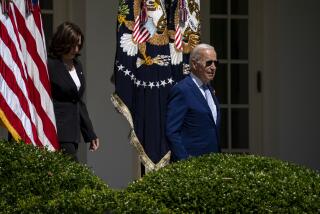Lungren Urges Bush Veto on Ocean Gambling Bill
- Share via
SACRAMENTO — State Atty. Gen. Dan Lungren said Tuesday that a bill approved by Congress last month would turn the clock back to an era when floating casinos operated freely off the California coast.
Lungren has urged President Bush to veto the measure that would allow gambling on U. S. passenger ships for the first time in 40 years.
The legislation passed quietly in January with the avowed purpose of boosting the U. S. cruise ship industry. Unlike their foreign competitors, American-flag vessels are not allowed to carry gambling devices--a prohibition in place since 1951.
The Bush Administration believes the measure will be helpful to the U. S. maritime industry and is unopposed to the bill, said a top U. S. Department of Justice official in response to a letter from Lungren.
But as California’s chief law enforcement official, Lungren attacked the bill as one more expansion of legalized gambling, bringing with it the threat of added prostitution, loan-sharking, money-laundering, bribery and corruption, he said.
“Casino gambling off our coast is a lousy bet with terrible odds for the people of California,” Lungren told reporters. “We face enough threats to public safety right now, such as violent crime, drugs and gangs, without opening the door to the kind of organized criminal activity that gambling could potentially attract.”
Lungren said that the bill would allow American operators to begin offering “voyages to nowhere”--trips that would take passengers more than three miles off the coast, just beyond the state’s jurisdiction, solely for gambling.
In response to a letter of complaint about the bill from Lungren, Assistant U.S. Atty. Gen. W. Lee Rawls wrote on Tuesday that the Bush Administration does “not agree with the thrust of your letter that this ‘voyage to nowhere’ exception or the bill as a whole opens the door to unregulated floating casinos.”
Rawls said that “if the principal purpose of a voyage can be shown to be gambling, a prosecution . . . could be undertaken.”
Under the bill, a state could continue to ban gambling within its coastal waters and on cruises from one state port to another--voyages that took passengers from San Francisco to Los Angeles, for example, or that left a California port only to return again after several hours.
But Lungren said he believed it might take a change in California law to allow officials here to prevent the operation of unregulated, floating casinos.
He spoke to reporters in front of blowups of newspaper clippings from 1939, when an earlier state attorney general, Earl Warren, led raids against casino barges anchored off Santa Monica and Long Beach.
Continental Coastline Inc., a Fremont, Calif.-based firm, has already announced plans to operate two cruises ships between Los Angeles and San Francisco if the gambling restrictions on U. S. vessels are lifted.
Supporters of the measure, including Rep. Gene Taylor (D-Miss.), have argued that the federal statute barring gambling devices is largely responsible for the decline of a once-vigorous U. S. passenger ship industry.
The aim of the federal measure is to reverse that decline and is supported by shipbuilders and organized labor, said Hugh Johnston, minority counsel for the House Committee on Merchant Marine and Fisheries.
Johnston noted that foreign cruise ships are able to offer gambling once they reach the high seas but that vessels flying under the U. S. flag cannot because of the ban on gambling devices.
“It’s an equity issue,” Johnston said.
More to Read
Get the L.A. Times Politics newsletter
Deeply reported insights into legislation, politics and policy from Sacramento, Washington and beyond. In your inbox three times per week.
You may occasionally receive promotional content from the Los Angeles Times.










